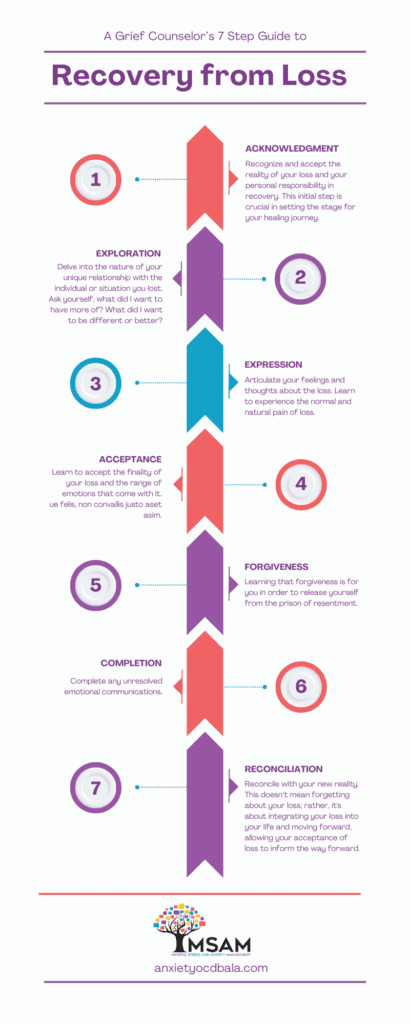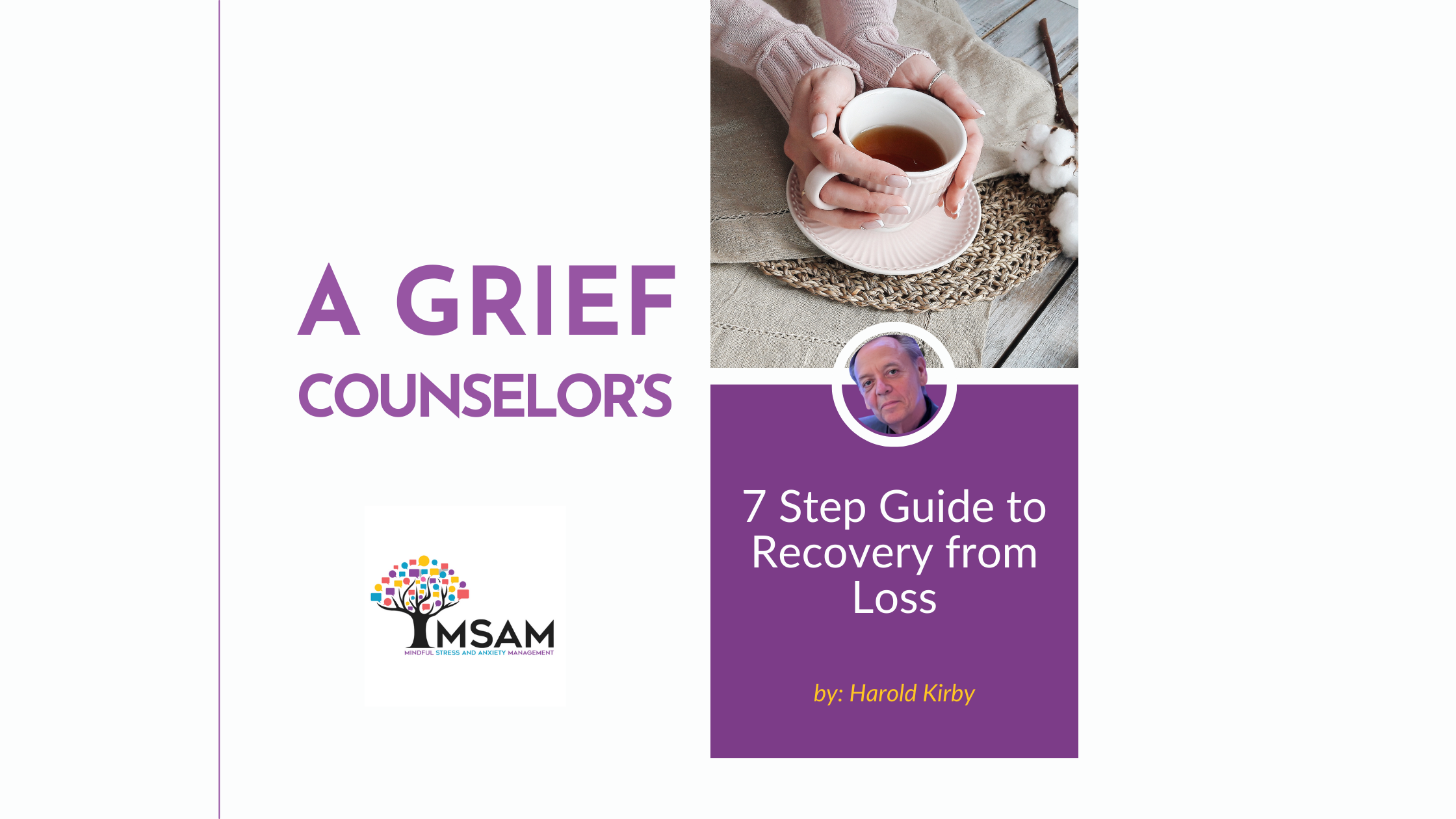A Guide to Recovery From Loss
I know that taking the first step towards healing from loss can be confusing, daunting, and may even feel insurmountable. As a certified grief counselor, I’ve written this article to help you understand that is possible for you to grieve your loss, recover, and respectfully move on with your life.
You do not have to stay lost in unremitting suffering — and there are clear steps you can take in your journey through grief after loss towards healing.
This guide provides compassionate and practical insights into loss. It will help you understand your grief as natural and normal. You will also learn the tools you will need to navigate life after the loss you have experienced.
Whether you’re dealing with the death of a loved one, a painful breakup, the loss of a beloved pet, the loss of a job, or any other life-altering loss, I hope this article will inspire hope and act as a beacon of light and inspire you to begin the process.
Let’s explore the process of learning to relieve the suffering of your darkest moments, illuminating the path and steps to recovering a life worth living.

A Grief Counselor's Approach to Recovery from Loss
As a cognitive behavioral therapist with 30 years of experience, I have found one approach to processing grief to be the most helpful for my patients and grief groups.
It’s called the Grief Recovery Method® and, unlike other grief management approaches, doesn’t simply mask the pain or hurry you through a process.
Instead, the Grief Recovery Method® guides you towards compassionately and effectively confronting your grief and understanding it, ultimately experiencing and moving through it to completion.
A salient feature of the grief recovery method is its emphasis on achieving emotional completion.
A good grief recovery plan invites you to fully experience normal and natural emotions while skillfully learning to avoid the traps of distraction, suppression, or evasion.
This candid confrontation cultivates a profound comprehension of your grief, forging a pathway to identifying and completing feelings of loss, abandonment, or betrayal.
One of the most compelling aspects of this method is the sense of hope it nurtures. It reassures us that although grief and its ensuing pain may be an inevitable part of life, it need not be a perpetual sentence to unremitting sorrow.
Through this method, we acquire the ability to bear our loss without allowing it to eclipse our potential for experiencing life, love, and joy anew.
Grief Recovery Method® offers a compassionate and potent pathway to understanding and healing from grief. It is a lighthouse in our darkest hours and a guide toward a future where grief no longer monopolizes our perception and existence.
You will learn to recover from your grief with deep respect for your loss while regaining your connection to a life you can value and care about.
A Roadmap for Grief Recovery
Grief Recovery Method® lays out a clear, systematic, and achievable method for recovery as follows:
- It emphasizes the importance of diving deep into one’s sorrow rather than avoiding or covering up the pain.
- It encourages individuals to face their grief head-on, fostering understanding and resilience.
- The method focuses on achieving emotional completion, encouraging individuals to express their emotions fully rather than avoiding or suppressing them.
- It offers a personalized action plan that aligns with your unique grieving process, rejecting a one-size-fits-all approach.
- This method provides guidance and clarity in navigating the confusing and often overwhelming grief journey.
- A key aspect of the method is the sense of hope it nurtures, reaffirming that although grief is a part of life, it is not a permanent state.
- Through this method, individuals gain the capacity to carry their loss without letting it overshadow their potential for experiencing joy and love again.
- In essence, the grief recovery method is a compassionate and effective pathway to understanding and healing from grief.
The 7 Step Grief Recovery Method
As a grief counselor with over 30 years of cognitive behavioral therapy experience, the Grief Recovery Method® sets forth a step-by-step recovery program that works. Here are the 7 steps my patients navigate when we use the process:
- Acknowledgment – Recognize and accept the reality of your loss and your personal responsibility in recovery. This initial step is crucial in setting the stage for your healing journey.
- Exploration – Delve into the nature of your unique relationship with the individual or situation you lost. This involves exploring your unique emotional attachments, expectations, and unrealized dreams. Ask yourself, what did I want to have more of? What did I want to be different or better?
- Expression – Articulate your feelings and thoughts about the loss. Learn to experience the normal and natural pain of loss.
- Acceptance – Learn to accept the finality of your loss and the range of emotions that come with it.
- Forgiveness – Learning that forgiveness is for you in order to release yourself from the prison of resentment.
- Completion – Complete any unresolved emotional communications.
- Reconciliation—Reconcile with your new reality. This doesn’t mean forgetting about your loss; rather, it’s about integrating your loss into your life and moving forward, allowing your acceptance of loss to inform the way forward.

Remember, the journey to recovery from grief is as individual as our fingerprints.
As a grief counselor in South Carolina, New Jersey, and Pennsylvania, I know from decades of experience that some aspects of completion might take longer than others, and that’s perfectly okay.
What's Your Next Step in Your Grief Recovery Journey?
You’ve taken the first steps. Together, we’ve delved into the profound journey of grief recovery, examining the seven-step method outlined in The Grief Recovery Method® Handbook.
The journey starts with acknowledging one’s loss and moving forward to explore the unique relationship and emotions tied to it. Expressing these feelings and accepting the finality of the loss is crucial to recovery from loss.
After that, consider your own personal journey. What step might you consider exploring next?
Option 1: Download the Handbook
Download the Grief Recovery Method® Handbook now, with no email registration required. Simply click the button below and the PDF document will open in a new window, allowing you to read or print to read later.
Option 2: Find a Grief Counselor
If you’re ready to explore working with a grief counselor, you can find me here. Or, search for a GRM counselor by visiting the Grief Recovery Method® counselor search page.
The process then continues with forgiving oneself and others, concluding any unfinished emotional correspondence, and finally reconciling with the new reality.
Remember, this journey is deeply personal and varied. It’s totally fine if some steps take longer than others. What is most important is to begin your journey and recover from the pain held in incomplete emotion.
Warmest Regards, MSAM
Harold P. Kirby is a certified Grief Recovery Specialist utilizing the Grief Recovery Method®. He is devoted to helping people move beyond the pain of loss and regain their ability to lead a fully engaged life. Harold works with individuals in addition to leading a Grief Recovery Group.
He is a Cognitive Behavioral Therapist with 30 years of experience and offers treatment for non-grief-related issues as well, His specialties include: CBT, E/RP, EMDR, Mindfulness-Based Stress Reduction, Mindfulness-Based Cognitive Therapy, ACT (Acceptance and Commitment Therapy, and DBT).
Work With Harold
If you are in South Carolina, New Jersey, or Pennsylvania, I can help.

